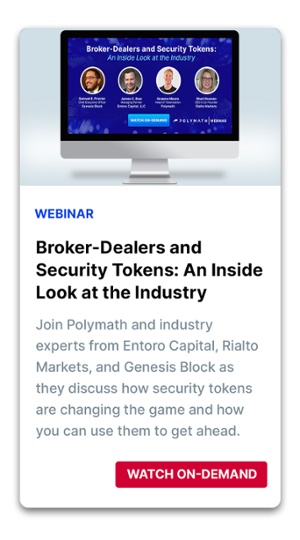Security tokens, if you don’t know, are digital representations of securities that take advantage of blockchain technology to offer major business benefits, from making processes more efficient and cutting costs to offering additional liquidity and boosting capital efficiency.
Navigating this rapidly evolving space to take advantage of tokenization, however, can prove a multi-faceted challenge. For that reason, we’ve put together a list of the 10 questions every broker-dealer needs to ask about security tokens.
1. How many big security token issuances have there been?
Big security token deals used to be few and far between, but these days momentum is accelerating—and fast. A PWC report revealed that 380 security token offerings raised a total of $4.1B in the first 10 months of 2019. And in early 2020, RedSwan CRE Marketplace tokenized $2.2B in commercial real estate. This was one of the biggest tokenizations we’ve seen so far and one that well illustrates the benefits digital assets bring to traditionally illiquid markets.
 2. How can security tokens enable new types of securities?
2. How can security tokens enable new types of securities?
Tokenization makes new securities possible. Here’s how: with blockchain automation, the heavy reconciliation and manual compliance checks that make certain types of securities too difficult or expensive to manage in the traditional lifecycle are all but eliminated. This means complex securities that require frequent capital distribution, fractionalization or aggregation can be offered to investors without breaking a sweat.
3. How do security tokens create efficiency?
Security tokens automate many aspects of the security creation and management process, but efficiency through process automation is only the tip of the iceberg. There is also the enhanced transparency provided by blockchain, which adds accuracy and clarity to asset ownership to greatly reduce the difficulty of auditing and reconciliation.
4. How do different jurisdictions manage security tokens?
Every jurisdiction handles security tokens differently. For example, in Switzerland security token issuers largely follow the same financial framework as traditional issuers. Lichtenstein, meanwhile, gave security tokens their own legal framework when it passed the Blockchain Act in 2019. This article provides an overview of legal definitions of digital securities and security tokens in different countries, but the most important thing is to consult a lawyer familiar with the jurisdictional specifics.
5. How are security tokens different from traditional securities?
Security tokens are digital representations of securities (like debt, equity or real estate) on a blockchain. Just like traditional securities, security tokens are subject to regulation and need to conform to strict compliance standards. In contrast though, security tokens allow for many traditionally cumbersome and highly-manual processes to be automated, and provide a golden source of truth that all parties can depend on.
6. Why should issuers and investors be excited about security tokens?
Issuers have several reasons to believe an STO (security token offering) is the way to go, among the most enticing being that it could work out 40% cheaper than a traditional private placement. Investors, on the other hand, can have their heads turned by the opportunity to buy into previously unaffordable asset classes through fractional ownership. They’re also likely to benefit from reduced trading fees made possible by improved efficiency, and faster release of capital thanks to rapid settlement cycles.
7. What do security tokens mean for the future of capital markets?
Security tokens are likely to transform capital markets over the next decade through shifts including 24/7 market hours, lower barriers to entry and more inclusive access. Add in the automated compliance and instant reconciliation enabled by blockchain, and investors and asset owners will come to expect hyper-efficiency and a flawless customer experience. Broker-dealers will need to offer all these benefits to keep up.
8. How will security tokens change the role of broker-dealers?
Some envision a decentralized world without intermediaries like broker-dealers. In practice, however, we’re seeing evidence that broker-dealers remain especially sought-after in blockchain-based markets because they still have a key role to play in executing large trades, providing liquidity, and allowing for smooth securities trading flow.
9. What is holding back broader institutional adoption?
Security tokens present a massive shift from how securities have traditionally been managed and that alone brings big challenges—one of the biggest being infrastructure specificity. General-purpose blockchains weren’t built for securities and as a result, are missing the identity, compliance, confidentiality, and governance controls that institutions need in order to be able to fully embrace security tokens.
10. Does it matter which blockchain we use?
Blockchains that go beyond general-purpose infrastructure like Ethereum and instead are purpose-built for specific use cases (e.g. supply chain or cross-border payments) are becoming more common these days. In order to provide the right experience to all stakeholders, securities need a blockchain of their own that’s designed with the space’s many regulatory and functional nuances in mind.
Polymath hosted a webinar with industry experts from Entoro Capital, Rialto Markets and Genesis Block to further explore these issues and more. Titled Broker-Dealers and Security Tokens: An Inside Look at the Industry, the webinar is a chance to get an informed view on how security tokens are changing the game and how broker-dealers can use them to get ahead.
Learn more about using Polymath’s technology to offer end-to-end security tokenization services to your clients.

